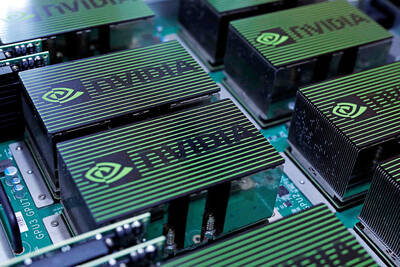The partnership between US Steel Corp and Nippon Steel Corp has reached a new phase, with an agreement on US national security guarantees, in addition to the so-called “golden share” advantage obtained by US President Donald Trump’s administration.
Trump on Friday evening signed an executive order approving the partnership, bringing an end to the long-running saga over foreign ownership of a key national asset that began in December 2023, when US Steel and Nippon Steel announced plans for a US$14.9 billion merger.
However, the deal was held up by former US president Joe Biden, who blocked it in his last weeks in the White House on national security grounds.

Photo: Reuters
Trump initially opposed Nippon Steel’s takeover plan, calling for US Steel to remain domestically owned, but he threw his support behind a “partnership” last month.
“US Steel will REMAIN in America, and keep its Headquarters in the Great City of Pittsburgh,” Trump wrote on social media.
In a joint statement, US Steel and Nippon Steel said Trump “has approved the companies’ historic partnership that will unleash unprecedented investments in steelmaking in the United States, protecting and creating more than 100,000 jobs.”
“In addition to President Trump’s Executive Order approving the partnership, the companies have entered into a National Security Agreement [NSA] with the US Government,” they said, which calls for approximately US$11 billion in new investments to be made by 2028.
Trump’s executive order did not provide details about the NSA, but he reserved the authority to issue further orders “as shall in my judgment be necessary to protect the national security of the United States.”
Friday’s announcement follows a review of the deal by the Committee on Foreign Investment in the US, which is tasked with analyzing the national security implications of foreign takeovers of US companies.
US Secretary of Commerce Howard Lutnick on Saturday insisted on the need for the “perpetual Golden Share,” which gives the US government the right to block any action it so chooses.
Lutnick did not elaborate on the precise value of the share, saying only that it had “powerful terms that directly benefit and protect America, Pennsylvania, the great steelworkers of US Steel and US manufacturers.”
He gave a list of examples of actions that the US government would have to approve, including any relocation of US Steel headquarters, moving the company outside the US, changing its name or moving jobs outside the country.

Leading Taiwanese bicycle brands Giant Manufacturing Co (巨大機械) and Merida Industry Co (美利達工業) on Sunday said that they have adopted measures to mitigate the impact of the tariff policies of US President Donald Trump’s administration. The US announced at the beginning of this month that it would impose a 20 percent tariff on imported goods made in Taiwan, effective on Thursday last week. The tariff would be added to other pre-existing most-favored-nation duties and industry-specific trade remedy levy, which would bring the overall tariff on Taiwan-made bicycles to between 25.5 percent and 31 percent. However, Giant did not seem too perturbed by the

AI SERVER DEMAND: ‘Overall industry demand continues to outpace supply and we are expanding capacity to meet it,’ the company’s chief executive officer said Hon Hai Precision Industry Co (鴻海精密) yesterday reported that net profit last quarter rose 27 percent from the same quarter last year on the back of demand for cloud services and high-performance computing products. Net profit surged to NT$44.36 billion (US$1.48 billion) from NT$35.04 billion a year earlier. On a quarterly basis, net profit grew 5 percent from NT$42.1 billion. Earnings per share expanded to NT$3.19 from NT$2.53 a year earlier and NT$3.03 in the first quarter. However, a sharp appreciation of the New Taiwan dollar since early May has weighed on the company’s performance, Hon Hai chief financial officer David Huang (黃德才)

NVIDIA FACTOR: Shipments of AI servers powered by GB300 chips would undergo pilot runs this quarter, with small shipments possibly starting next quarter, it said Quanta Computer Inc (廣達), which supplies artificial intelligence (AI) servers powered by Nvidia Corp chips, yesterday said that AI servers are on track to account for 70 percent of its total server revenue this year, thanks to improved yield rates and a better learning curve for Nvidia’s GB300 chip-based servers. AI servers accounted for more than 60 percent of its total server revenue in the first half of this year, Quanta chief financial officer Elton Yang (楊俊烈) told an online conference. The company’s latest production learning curve of the AI servers powered by Nvidia’s GB200 chips has improved after overcoming key component

UNPRECEDENTED DEAL: The arrangement which also includes AMD risks invalidating the national security rationale for US export controls, an expert said Nvidia Corp and Advanced Micro Devices Inc (AMD) have agreed to pay 15 percent of their revenue from Chinese artificial intelligence (AI) chip sales to the US government in a deal to secure export licenses, an unusual arrangement that might unnerve both US companies and Beijing. Nvidia plans to share 15 percent of the revenue from sales of its H20 AI accelerator in China, a person familiar with the matter said. AMD is to deliver the same share from MI308 revenue, the person added, asking for anonymity to discuss internal deliberations. The arrangement reflects US President Donald Trump’s consistent effort to engineer